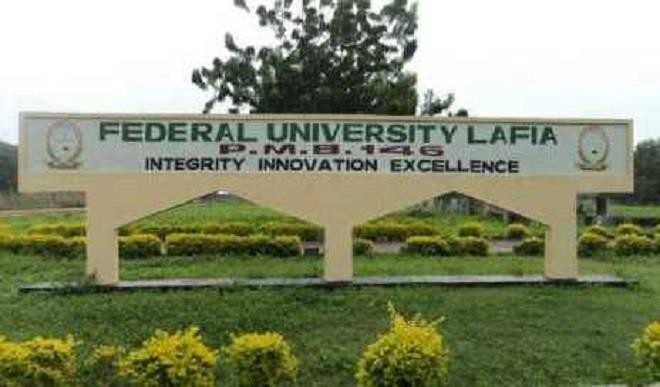Education
FG, EU introduces programme for disadvantaged children to access education

The Federal Government in partnership with the European Union (EU) has introduced an Accelerated Basic Education Programme to enable disadvantaged children of between 10 and 18 years have access to basic education.
The Executive Secretary, Nigerian Educational Research and Development Council (NERDC), Prof. Ismail Junaidu presented the pogramme to the Minister of Education, Mallam Adamu Adamu in Abuja on Thursday.
Junaidu said the programme was to reduce to the barest minimum the number of out-of-school children.
He said that the programme, which was flexible and free for enrollment would provide the recipients with equivalent, certified competences for basic education using effective teaching and learning approaches.
The NERDC boss said that the learning approaches would match their cognitive maturity.
He added that it would also provide pathways to mainstreaming learners into relevant levels of schooling based on proper profiling and effective instruction and learning.
According to him, piloting of the programme began immediately in 54 centres in Borno with over 8,000 learners enrolled.
“Preliminary result from the piloting shows that the programme is indeed a way out from the menace of out-of-school children and youth in Nigeria’’
Also, the Interim Country Director, Plan International Nigeria, Mr Robert Komakech, said the goal of the EU was to increase access to safe, quality and inclusive education opportunities both formal and non-formal for conflict affected children, adolescents and youth.
Komakech said that this would address the specific barriers of girls and boys in the view of improving retention and completion, achieving better learning outcomes.
He said that the Plan-lead consortium signed a Memorandum of Understanding (MOU)for the development of a National Curriculum to cater for the educational needs of learners that had dropped out of school for one reason or the other.
Responding, the Minister of Education, represented by the Permanent Secretary, Mr Sonny Echono, said that all stakeholders would be carried along to ensure successful implementation of the Accelerated Basic Education Programme.
Adamu assured the country of the need to pursue the programme vigorously to achieve a 90 per cent literacy rate.
He added that the ministry would also support the national rollout plan of the programme throughout the institutions of learning in the country.
Education
Inclusive Education Boost as Deaf-Tech, Federal University of Lafia Roll Out Master’s in Disability Studies

Joel Ajayi
In a major step toward advancing inclusive education in Nigeria, Deaf-in-Tech, an initiative of Data-Lead Africa, has signed a Memorandum of Understanding (MoU) with the Federal University of Lafia (FULAFIA) to establish a Professional Master’s Degree in Disability Studies.
The signing ceremony, held at Deaf-in-Tech’s headquarters in Abuja, featured a goodwill message from Prof. Adaka Terfa Ahon, Director of the Centre for Disability Studies, who represented FULAFIA’s Vice Chancellor, Prof. Shehu Abdul Rahman. He reaffirmed the university’s commitment to championing disability and inclusion in its academic innovation and planning.
The new Master’s programme will adopt a hybrid learning model, with online classes complemented by in-person sessions at Deaf-in-Tech’s training facility in Abuja. It is designed to build expertise in disability-inclusive governance, education, and development across sectors.
Executive Director of Deaf-in-Tech and Co-Founder of Data-Lead Africa, Dr. Arowolo Ayoola, described the collaboration as a “structural shift” in how institutions and professionals engage with disability issues. “The inclusion journey must begin with knowledge, and we are proud to partner with a progressive university like FULAFIA,” he said.
Beyond the postgraduate programme, the partnership will also establish a Deaf-in-Tech Club on FULAFIA’s campus — the first of its kind — to empower Deaf students with technology skills, mentorship, and innovation opportunities. Additional initiatives include a ₦1 million academic excellence reward for any Deaf student who graduates with a First Class, as well as the development of a disability-accessible website and digital database for the Centre for Disability Studies, built to WCAG 2.1 global accessibility standards.
The alliance underscores both institutions’ commitment to building inclusive systems and celebrating excellence, while positioning Deaf-in-Tech as a catalyst for bridging the gap between disability and the digital economy.
-

 Featured6 years ago
Featured6 years agoLampard Names New Chelsea Manager
-

 Featured6 years ago
Featured6 years agoFG To Extends Lockdown In FCT, Lagos Ogun states For 7days
-

 Featured6 years ago
Featured6 years agoChildren Custody: Court Adjourns Mike Ezuruonye, Wife’s Case To April 7
-

 Featured6 years ago
Featured6 years agoNYSC Dismisses Report Of DG’s Plan To Islamize Benue Orientation Camp
-

 Featured4 years ago
Featured4 years agoTransfer Saga: How Mikel Obi Refused to compensate me After I Linked Him Worth $4m Deal In Kuwait SC – Okafor
-
Sports3 years ago
TINUBU LAMBAST DELE MOMODU
-

 News10 months ago
News10 months agoZulu to Super Eagles B team, President Tinubu is happy with you
-
Featured6 years ago
Board urges FG to establish one-stop rehabilitation centres in 6 geopolitical zones
